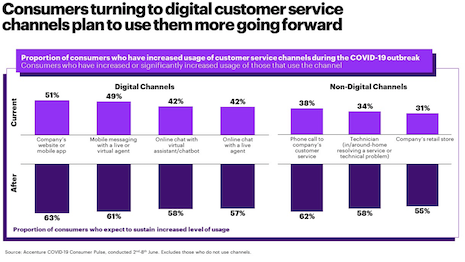- About
- Subscribe Now
- New York,
August 18, 2020

 Consumers are using more digital customer service channels in the COVID-19 era. Image courtesy of Accenture
Consumers are using more digital customer service channels in the COVID-19 era. Image courtesy of Accenture
COVID-19 has transformed the retail and hospitality businesses as consumers become more locally focused, forcing companies to adjust their service offerings to to connect with their audience during this new “decade of the home.”
Ongoing discomfort in visiting public spaces and travel, in addition to growing financial fears amid widespread decline in household income, will continue to keep most consumers at home, according to a new report from Accenture that includes feedback from 8,800 people across 20 countries.
“What COVID-19 has highlighted is that companies have to tailor their product and service portfolios, and the digital shopping experience will need to improve considerably,” said Jill Standish, senior managing director and head of Accenture’s global retail practice in New York.
“Brands and retailers that offer enhanced shopping experiences with free services, such as personal stylists and fit specialists, could get a bigger share of a growing market,” she said.
“Nordstrom offers clients the personalized service of personal, beauty and design specialists that can assist with product selections, taking the in-store experience straight to their homes.
“Shoppers can chat online with the team, or call a toll-free number. The process is simple: Customers communicate what wardrobe items they’re seeking and suggestions can be made live.
“Alternatively, the team will send customers a style survey through which they can note their color preferences, sizing information, and other key elements of their needs. A text will be sent with a link to actual wardrobe selections. Shoppers can then follow up with a call to discuss or place an order.”
 Consumers are spending more time at home this year and plan to do so for the foreseeable future. Image courtesy of Accenture
Consumers are spending more time at home this year and plan to do so for the foreseeable future. Image courtesy of Accenture
Home sweet home
Sixty-nine percent of consumers anticipate that they will do most of their socializing in their home or a friend’s home over the next six months.
Sixty-five percent of consumers are currently connected with friends and family virtually, and 75 percent plan to after the pandemic is over. Fifty-eight percent are trying new recipes and 82 percent plan to do so after it is over, per the Accenture report.
Additionally, people are spending more time on home improvement, online education and new hobbies, and plan to keep up these behaviors into the future.
“People are still social, so companies need to pivot to serve these new social and creative occasions in and around the home,” Ms. Standish said.
“For instance, offering products that recreate the experience of going out,” she said. “Creating virtual communities that bring together people with similar interests. Shaping premium virtual experiences that allow people to connect with others and interact with products in more elaborate ways.”
Fifty-six percent said the pandemic has caused them to shop in closer neighborhood stores and 79 percent plan to continue to do so long-term.
Fifty-six percent of consumers said they are buying more locally sourced products and 84 percent plan to continue to do so even after the pandemic subsides.
“The pandemic is likely to produce a more sustainable, healthier era of consumption, making consumers think more about balancing what they buy and how they spend their time with global issues of sustainability,” Ms. Standish said.
“It’s a call to action for companies to ensure they have the agility and capability to be relevant to consumers and customers — with a portfolio of products and services that match shifting purchasing patterns,” she said.
“Over lockdown, we have witnessed more demand than ever from contemporary and luxury fashion brands looking to incorporate rental into their business model.
“With the rental and resale market driven by millennials and Gen Z at the moment, this demographic’s loyalty to the environment and socially responsible businesses has already proven to be a significant factor in driving purchase behavior.”
 Consumers have adopted more online services during the pandemic and they plan to keep up this behavior. Image courtesy of Accenture
Consumers have adopted more online services during the pandemic and they plan to keep up this behavior. Image courtesy of Accenture
Digital marketing reigns
Consumers have been using more digital customer service channels during the pandemic and plan to do so more often in the future. Brands have an opportunity to learn from these conversations for future marketing campaigns.
“The unseen advantage of a shopping experience that is powered by technology is the tremendous opportunity to capture more information about customers' shopping journeys, trends and motivations that can later serve to inform and guide more relevant customer experiences,” Ms. Standish said.
“In particular, [a key advantage is] the ability to share personalized information across channels through unique customer data platforms and provide tailor-made propositions,” she said.
“Store assistants will have an insight into the style DNA of their customers available during their shopping trips and, therefore, adapt to provide a tailor-made proposition during the interaction.”
Share your thoughts. Click here